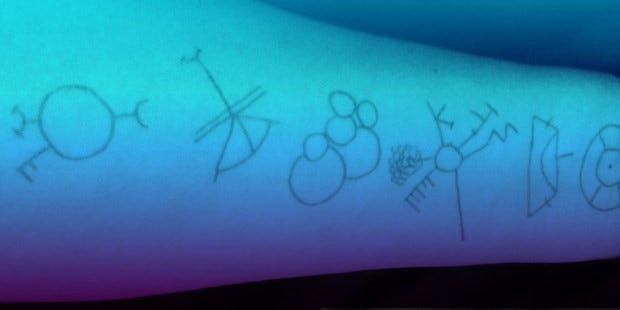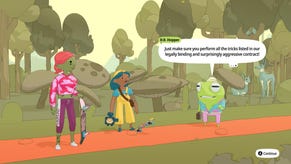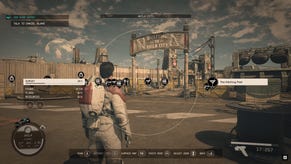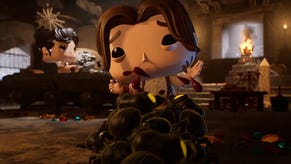Physically Interactive Fiction: With Those We Love Alive
A visit to a dead world, with drawing!
One of these symbols I drew on my arm is a lie. With Those We Love Alive tells you to draw icons on your body to represent key choices and reactions, see, which is a lark until you realise you're marking and changing yourself in response to cruel and oppressive things. One icon represents something I like to think about myself, but know isn't true. I stared at that lie a lot the next day.
With Those We Love Alive is a free Twine game by Porpentine, a moving visit to a mundanely monstrous world. Her writing is so carefully measured, vivid yet small bursts, and a soundtrack by Brenda Neotenomie wraps the world around you. It is a beautiful and terrible game.
In a world filled with dead people, you're pressed into the service of a Empress who's literally monstrous. Her introduction, rising from black waters - "Her larval skin floats across the lake like the carcass of a pale leviathan" - sets the tone for a world where things are nightmarish but no one bats an eyelid. Horrors, violence, and death are everyday.
You stay at her palace, tasked with crafting weapons and ornaments, but have freedom to explore the grounds and the city beyond. With a handful of words, Porpentine creates space for a world that's wild and fantastical yet broken and defeated. It's exciting to explore at first, watching life go by at the canal, wandering streets, visiting temples, and walking the palace gardens, but soon you've seen it all. Then you're just there, isolated and alone, waiting for something to happen. The game runs on a day cycle, see, advancing when you sleep.
Days go by and you start barely getting out of bed because everything else seems pointless. New places open up, you sample lurid dream drugs, and you get to see more of the world from afar, but the novelty wears off. It's a sad world where people cling to whatever they can or simply give up.
You're waiting for someone to make a demand of you, to ask for your attention, your presence, or your skills. You can express yourself a little with the weapons you create for the Empress, choosing the materials - angel leather, blood-watered wood and other spooky materials - then inscribing and wrapping them, but they end up unused on the wall of her throne room. You start to sleep again. And then Things happen. I won't spoil it, but the mundanity is broken, and you find hope of being who you want to be.
It's a game about how we create ourselves in the space we're allowed by society, and how we respond to its demands and the many forms of violence that surround us. It's about the roles we have to play, and the choices other people make for us. It's about complicity and complacency. It's about abandoning hope and finding it. It's about the routines and demands of bodies. It's about being so, so tired. (A trans allegory runs through it all, but it feels weird to explicitly state that.) And, at key points, we have to draw our reaction to these things somewhere on our body with an icon of our own creation. By the end, we're marked with the decisions we've made. It's a fun excuse to draw spooky sigils on yourself, but feeling the pen tip pressing to your flesh and later seeing your identity on you is powerful. I stared a lot at the lie I tell myself about the kind of person I am, about how good I think I am and how good I wish I were.
I found it awfully moving. Porpentine's careful language and the melancholy soundtrack invited me to fill in the rest of its world with mine. I can close my eyes and see the canal and the rat kids scratching for lungfish, snatches of London, Paris, and, curiously, Dark Souls.
Here's how my arm ended up. I ran out of space and moved onto my palm then my fingers:
[Porpentine used to have a column on RPS. It was really good.]










.jpg?width=291&height=164&fit=crop&quality=80&format=jpg&auto=webp)